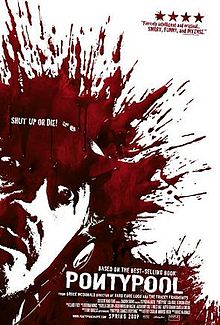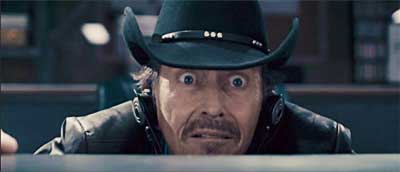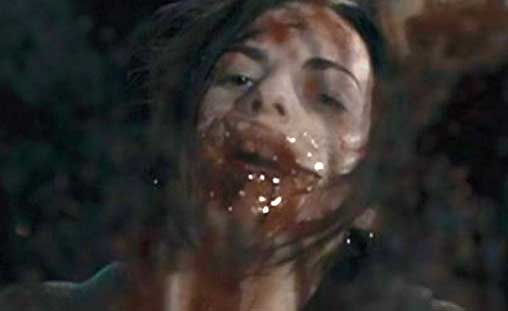 There’s never been a zombie movie like PONTYPOOL, a funny and intense Canadian import with possibly the nuttiest explanation for zombiedom I’ve ever encountered.
There’s never been a zombie movie like PONTYPOOL, a funny and intense Canadian import with possibly the nuttiest explanation for zombiedom I’ve ever encountered.
Canadian cinema’s resident anarchist Bruce McDonald, of HIGHWAY 61, HARD CORE LOGO and THE TRACY FRAGMENTS, apparently wanted to adapt the novel PONTYPOOL CHANGES EVERYTHING by Tony Burgess (not to be confused with the guy who wrote A CLOCKWORK ORANGE) since its initial publication in 1998. It took McDonald a decade to realize his ambition, although the 2008 film that emerged, scripted by Mr. Burgess, has little to do with the text, sharing only the overall concept (introduced in Neil Stephenson’s cyber classic SNOW CRASH, a copy of which is visible at one point in the film). Not to worry, though, because PONTYPOOL is apparently the first film of a projected trilogy, with parts two and three intended to properly flesh out the events of the novel.
Grant Mazzy is a disgraced shock jock broadcasting from a tiny radio station in Pontypool, Ontario. On his way to work one night a seemingly crazy woman thumps Grant’s car and then fades into the darkness—and the night only grows steadily crazier from there!
After enduring a lot of pontificating from his bitchy producer Sidney, Grant is made privy to a bizarre event unfolding in the area: a doctor besieged by a rabid mob. The station’s roving “helicopter” reporter (actually a guy in a car) gets caught in the melee, and an on-air BBC reporter queries Grant about an apparently deadly epidemic afflicting Pontypool. Then there’s a goofy music group called into the studio, one of whom, a little girl, begins babbling strangely. All of this is a bit too much for Grant, who attempts to bolt from the studio.
But a blizzard outside forces him back in—that and a mob of babbling zombie-like freaks converging on the station! Also in the area is the doctor Grant reported on earlier, who enters the station through a window. The doctor knows the source of the contagion spreading the insanity: the English language itself.
Apparently a disease has gotten into the language, transmitting itself through the spread of certain key words that when processed by the brain turn the thinker into a babbling freak who craves human flesh. This disease has afflicted much of the population of Pontypool, and before long claims a new victim: Grant’s young technician Laurel-Ann, who begins babbling and acting weird. Grant and Sidney find themselves trapped in the recording booth, desperately trying to find a nonverbal way of communicating with each other and the outside world.
PONTYPOOL isn’t a great film by any means, but as a tight, claustrophobic chamber piece it works quite well. Over ninety percent of the film takes place inside the besieged radio station, with much of the action conveyed through dialogue. While not a comedy, it is quite comedic in spots, and there’s little in the way of bloodletting (so I’m sure many of you will probably want to steer clear of the film).
Bruce McDonald commands attention by keeping his camera moving, particularly in the early scenes, but never excessively or distractingly so. He’s further blessed with an excellent performance by veteran supporting actor Stephen McHattie as Grant, who commands virtually every scene and is given terrific support by Lisa Houle (McHattie’s real-life spouse) and Georgina Reilly as his frazzled station mates.
Weird though it is, the film overall is a straightforward thriller far removed from the anarchic quirkiness of McDonald’s previous films. However, it contains many eccentric elements (such as a montage of contagion victims) that set it apart from the standard zombie movie fray.
Vital Statistics
PONTYPOOL
Maple Pictures/Crescent Raid Films
Director: Bruce McDonald
Producers: Jeffrey Coghlan, Ambrose Roche
Screenplay: Tony Burgess
Cinematography: Miroslaw Baszak
Editing: Jeremiah Munce
Cast: Stephen McHattie, Lisa Houle, Georgina Reilly, Hrant Alianak


